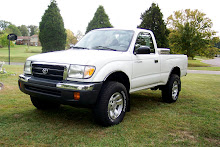Everyone today is interested in getting the best mileage they can out of the vehicle they drive. There are some tips to accomplish just that. Lets look at a few.
1. Slow down
By simply reducing your speed and driving the speed limit, you will use less fuel. Try it for a week and see if your journey is not more pleasant and you save fuel too. 12% Savings
2. Check Tire Pressure

Under-inflated tires hurt mileage due to higher rolling resistance. How much is debatable. Under & over-inflated tires will wear out faster thus costing you money to replace them. All tires will loose air pressure over time. Purchase a good tire gauge and check your pressure at least once every 2 weeks. Make sure the tires are cold to get an accurate reading. The correct tire pressure for you vehicle is listed in your owner's manual, on the driver's door post, glove box, console, or the trunk. Inflate your tires to that pressure. The pressure listed on the tires themselves is not the pressure to use. That is the maximum pressure the tire can hold. Do not over-inflate your tires. This effects handling and will cause premature tire wear. Notice the label from my Accord. Rear tires are 30 psi, but front tires are 32 psi. This is a typical label that all vehicles have posted somewhere. 1-2% Savings
3. Replace Air Filter
A dirty filter restricts air flow which hampers performance and economy. Replace every 30,000 miles or sooner if you drive in dusty conditions. Look through the filter with the sun or a light. If you cannot see through it, replace it.
4. Take Off Slowly
Take off with enough speed to not be a hindrance to others drivers, but not like you are drag racing. With an A/T accelerate at a moderate speed so the transmission can upshift quickly. With a manual shift to high gear ASAP but do not lug the engine. Watch down the road and let off the accelerator long before you have to stop. This will save you fuel in the long run. 31% Savings
5. A/C or no A/C
Run the A/C in hot weather with the windows up at highway speed. When in town shut the A/C off and lower the windows. The A/C uses less fuel at highway speeds than the wind resistance of open windows & especially sunroof. If you own a truck, keep the tailgate up. It is a myth that tailgate down uses less fuel. 1-2% Savings
6. Drive Steady
Drive a steady speed and avoid slowing down and speeding up. Use your cruise control on the open road but never in town or in rain, snow, or any other bad weather. In heavy highway traffic the cruise should also not be used. 7% Savings
7. OEM Tires
Install the exact same original equipment size tires that came on your vehicle. Larger tires with a wider footprint may look cool but they require more fuel to rotate. Incorrect size tires will effect the ride, handling, the accuracy of the speedometer/odometer.
8. Drive What You Need
It is a law of physics that smaller vehicles get better fuel mileage. The small cars built today have more interior room than large cars built years ago. If you do not need a large vehicle then drive a small car or truck. Take a test drive in a modern small car and see if it fits your needs. Look at the EPA fuel economy ratings for all vehicles and then make an intelligent choice as to what you need.
9. Loose the Weight
Extra weight in your trunk wastes fuel. The more weight the engine has to pull, the more fuel it uses. Remove everything from the trunk that you do not need to carry. If you rarely take long trips, keep the tank between 1/4 & 1/2 full. Gasoline weighs around 6 lbs and diesel around 7 lbs. An extra 10 gallons of fuel would weigh 60=70 lbs, and that cost you money to haul around.
10. Octane
One of the biggest myths that simply will not die is the octane myth. It goes like this. The higher the octane the more power and mileage you will get. This is absolutely untrue. No matter who tells you that have more power and get better mileage using premium fuel, it is simply a myth. Use the exact octane fuel your owner's manual lists. If your vehicle requires premium fuel then use premium fuel. Using a lower octane to save money on fuel costs may do serious damage to your engine. But if you vehicle list 87 octane, then using 89 or 91 is a total waste of money with zero benefits. I will discuss Octane in detail later on.
Bonus #11.
Do not let the engine idle when you know you will be stopped for over a minute or two.


No comments:
Post a Comment
Note: Only a member of this blog may post a comment.